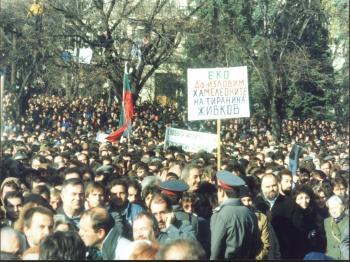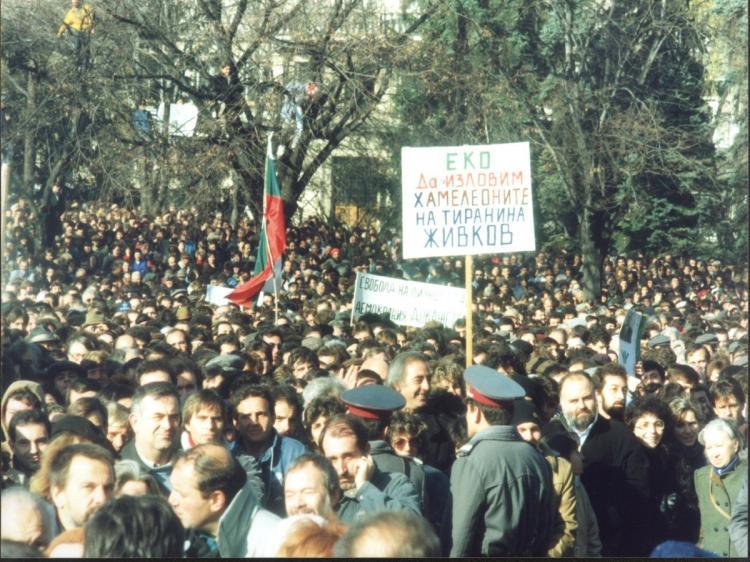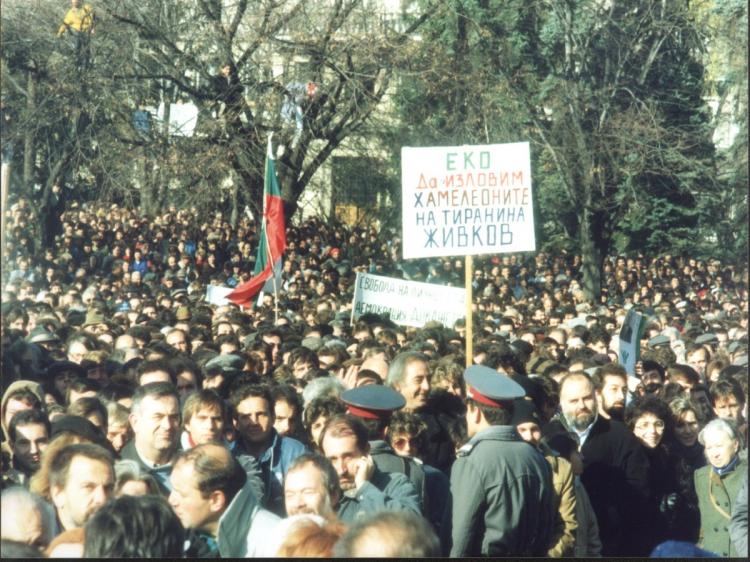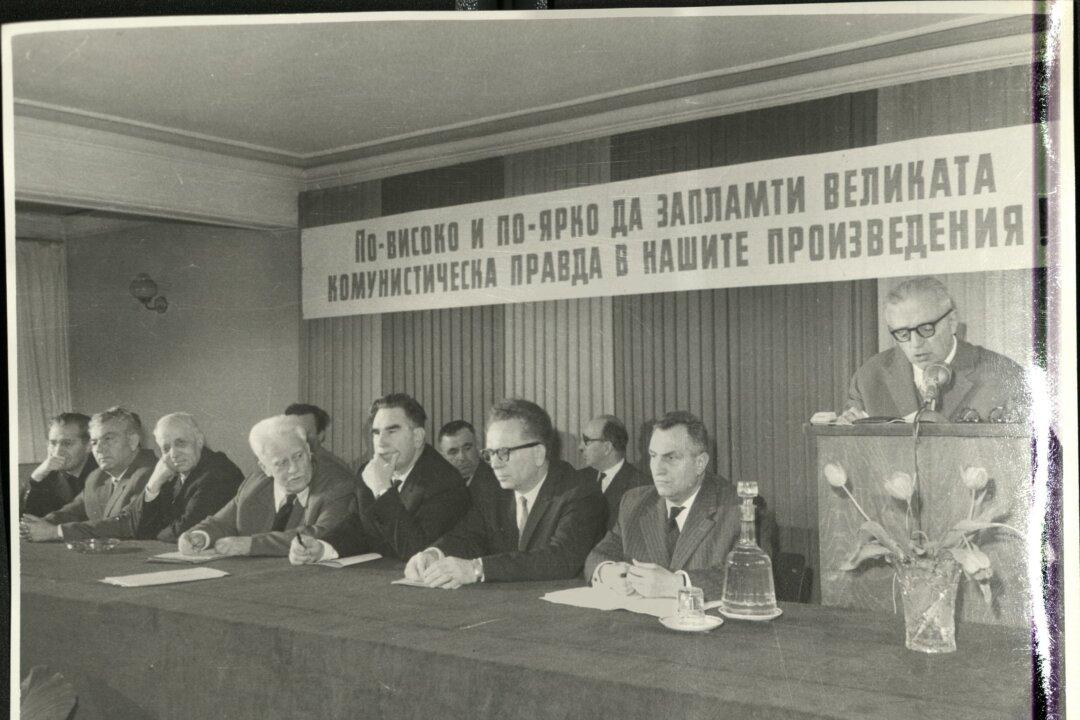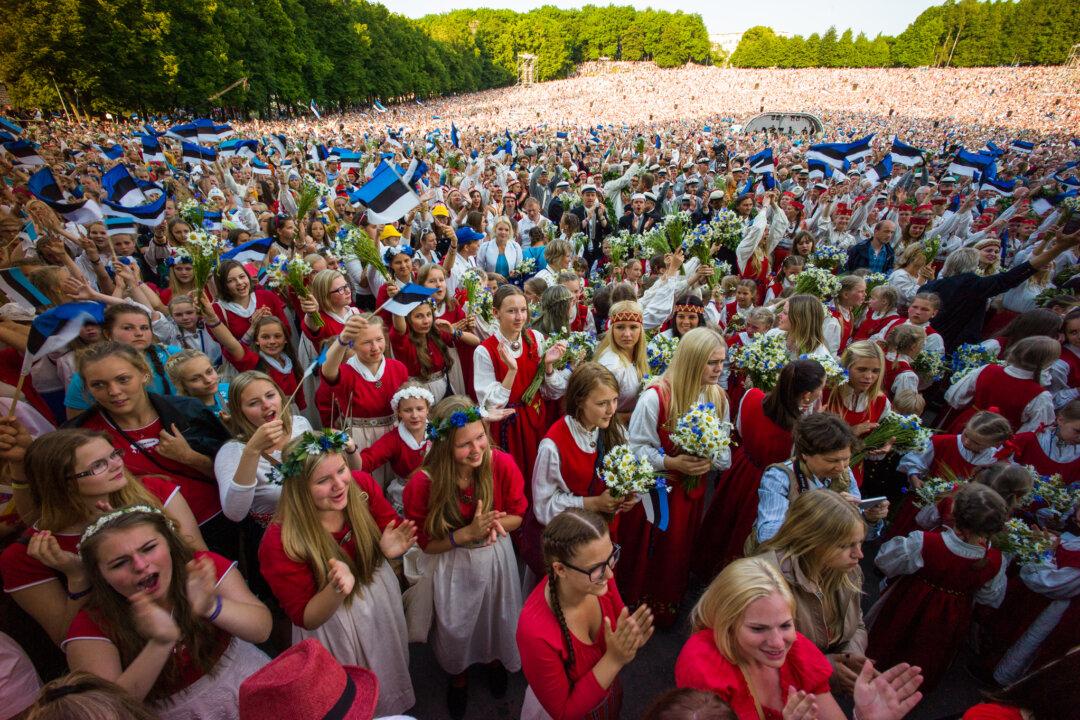A scandal sparked on Thursday in the halls of the Bulgarian National Parliament between Socialist and Democratic MPs over how to hold the memory of Sept. 9, 1944, the date marking the beginning of the communist era in Bulgaria.
The clash of words began after Andrey Pantev, member of Parliament from the leftist Bulgarian Socialist Party (BSP) introduced a declaration appealing for an end to decades of trying to distance contemporary Bulgaria from its communist past.
The declaration stated in positive terms that on Sept. 9, 1944 Bulgaria stopped being considered an “aggressor” and a country where 80 percent of the population was illiterate.
As a gesture of protest against the socialist declaration, all MPs from the rightist Blue Coalition left the parliamentary hall. They later put forward their own counterdeclaration.
Ivan Kostov, chairman of the Democrats for Strong Bulgaria, part of the Blue Coalition, expressed hope that starting from this day, each time anyone asks for rehabilitation of any communist symbols, there will be a MP who stands up and reads aloud a declaration by the 39th National Parliament adopted on Sept. 9, 2004.
The 2004 declaration condemns the communist regime established in 1944 and pays tribute to its victims. “We stand against all attempts for rehabilitation of its symbols and the misrepresentation of the communist past,” MPs declared in 2004.
During Thursday’s parliamentary session, Kostov explained that starting from Sept. 9, 1944, Bulgaria’s European orientation was cut off. Bulgaria was thrust into the socialist camp, its multiparty system abolished, and the country was forced to engage in a so-called utopian experiment that slowed down the country’s development.
The counterdeclaration, read aloud by the Blue Coalition leader, Kostov, asserts that Bulgarian communism stamped out human rights. The dictatorship deprived Bulgarian citizens of their freedom, humiliated their dignity, organized mass repressions of whole ethnic and religious groups, but could not achieve justice and welfare for its people.
Kostov reproached the main ruling party, the centrist GERB party (Citizens for European Development of Bulgaria), for not taking a stance against the leftist attempt to rehabilitate communist symbols.
Sixty-six years after communists took power in Bulgaria, Sept. 9 continues to divide the Bulgarian nation. Now two decades since the fall of communism on Nov. 10, 1989, the country has never officially condemned communist crimes.
According to Hristo Hristov, a leading Bulgarian investigative journalist, one of the main reasons is that the communist regime destroyed all resistance and opposition.
“They didn’t allow anyone to be outside the party. So it’s very hard to find a public figure who has not been an agent. Our President Georgi Parvanov is also an ex-informer of the secret police. Together with Romania we are the last in terms of lustration, which means a ban of former agents of the secret police from holding public posts,” said Hristov.
The clash of words began after Andrey Pantev, member of Parliament from the leftist Bulgarian Socialist Party (BSP) introduced a declaration appealing for an end to decades of trying to distance contemporary Bulgaria from its communist past.
The declaration stated in positive terms that on Sept. 9, 1944 Bulgaria stopped being considered an “aggressor” and a country where 80 percent of the population was illiterate.
As a gesture of protest against the socialist declaration, all MPs from the rightist Blue Coalition left the parliamentary hall. They later put forward their own counterdeclaration.
Ivan Kostov, chairman of the Democrats for Strong Bulgaria, part of the Blue Coalition, expressed hope that starting from this day, each time anyone asks for rehabilitation of any communist symbols, there will be a MP who stands up and reads aloud a declaration by the 39th National Parliament adopted on Sept. 9, 2004.
The 2004 declaration condemns the communist regime established in 1944 and pays tribute to its victims. “We stand against all attempts for rehabilitation of its symbols and the misrepresentation of the communist past,” MPs declared in 2004.
During Thursday’s parliamentary session, Kostov explained that starting from Sept. 9, 1944, Bulgaria’s European orientation was cut off. Bulgaria was thrust into the socialist camp, its multiparty system abolished, and the country was forced to engage in a so-called utopian experiment that slowed down the country’s development.
The counterdeclaration, read aloud by the Blue Coalition leader, Kostov, asserts that Bulgarian communism stamped out human rights. The dictatorship deprived Bulgarian citizens of their freedom, humiliated their dignity, organized mass repressions of whole ethnic and religious groups, but could not achieve justice and welfare for its people.
Kostov reproached the main ruling party, the centrist GERB party (Citizens for European Development of Bulgaria), for not taking a stance against the leftist attempt to rehabilitate communist symbols.
Sixty-six years after communists took power in Bulgaria, Sept. 9 continues to divide the Bulgarian nation. Now two decades since the fall of communism on Nov. 10, 1989, the country has never officially condemned communist crimes.
According to Hristo Hristov, a leading Bulgarian investigative journalist, one of the main reasons is that the communist regime destroyed all resistance and opposition.
“They didn’t allow anyone to be outside the party. So it’s very hard to find a public figure who has not been an agent. Our President Georgi Parvanov is also an ex-informer of the secret police. Together with Romania we are the last in terms of lustration, which means a ban of former agents of the secret police from holding public posts,” said Hristov.
